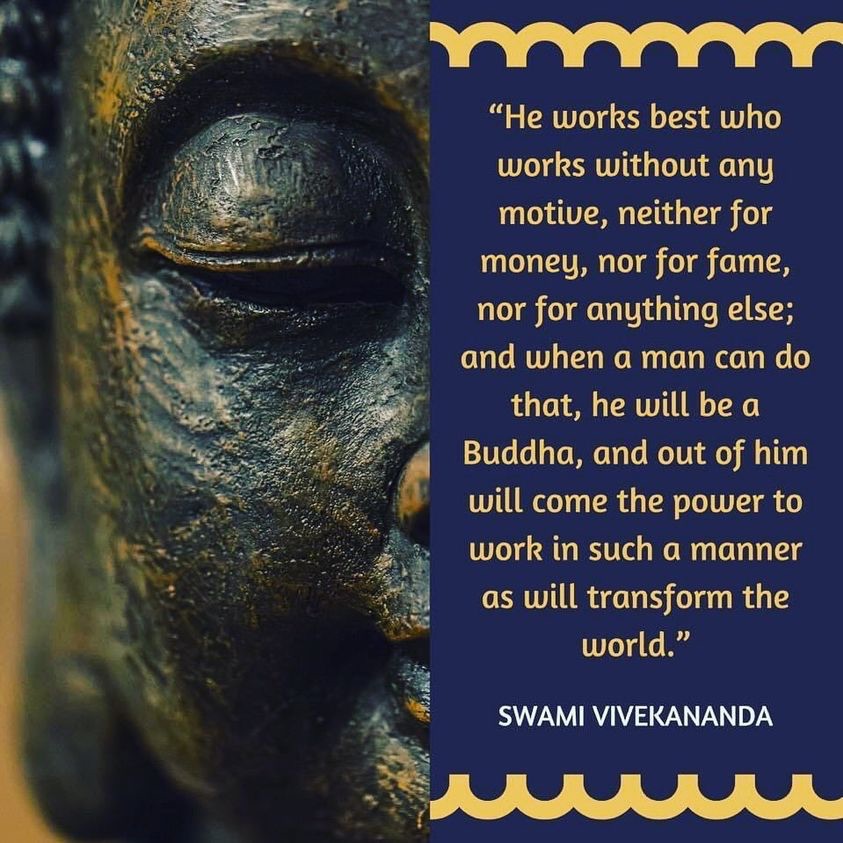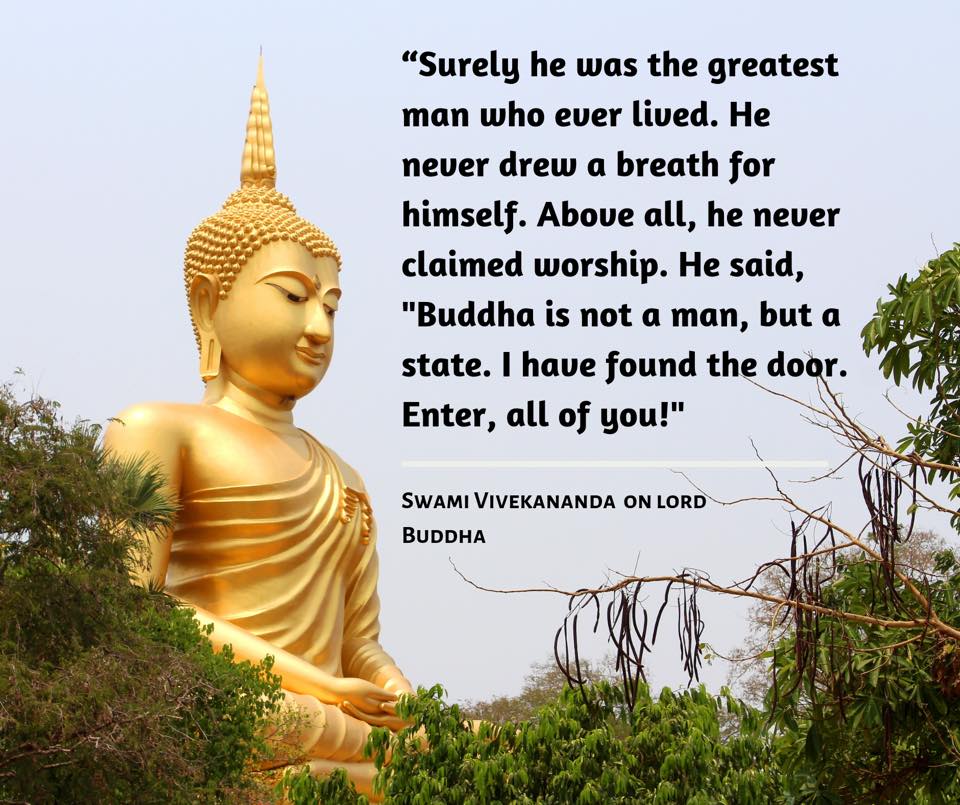
In this page, we’ll make a collection of Swami Vivekananda‘s quotes and comments on Gautama Buddha (Shakya Muni)
Swami Vivekananda on Gautama Buddha
- At the time Buddha was born, India was in need of a great spiritual leader, a prophet.
- All my life I have been very fond of Buddha. I have more veneration for that character than any other— that boldness, that fearlessness, and that tremendous love! He was born for the good of men. Others may seek God, others may seek truth for themselves; he did not even care to know truth for himself. He sought truth because people were in misery. How to help them, that was his only concern. Throughout his life he never had a thought for himself.
- Buddha believed that man must go to work and help others; find his soul in others; find his life in others.[Source]
- Buddha came to whip us into practice. Be good, destroy the passions. Then you will know for yourself whether Dvaita or Advaita philosophy is true — whether there is one or there are more than one.[Source]
- Buddha died at a ripe old age. I remember a friend of mine, a great American scientist, who was fond of reading his life. He did not like the death of Buddha, because he was not crucified. What a false idea! For a man to be great he must be murdered! Such ideas never prevailed in India. This great Buddha travelled all over India, denouncing her gods and even the God of the universe, and yet he lived to a good old age. For eighty years he lived, and had converted half the country.[Source]
- Buddha is expressly agnostic about God; but God is everywhere preached in our religion. The Vedas teach God — both personal and impersonal. God is everywhere preached in the Gita. Hinduism is nothing without God. The Vedas are nothing without Him. That is the only way to salvation. Sannyasins have to repeat the following, several times: I, wishing for Mukti, take refuge in God, who created the world, who breathed out the Vedas.[Source]
- Buddha is said to have denied the Vedas because there is so much Himsa (killing) and other things. Every page of Buddhism is a fight with the Vedas (the ritualistic aspect). But he had no authority to do so.[Source]
- Buddha made the fatal mistake of thinking that the whole world could be lifted to the height of the Upanishads. And self – interest spoilt all. Krishna was wiser, because He was more politic. But Buddha would have no compromise. The world before now has seen even the Avatara ruined by compromise, tortured to death for want of recognition, and lost. But Buddha would have been worshipped as God in his own lifetime, all over Asia, for a moment’s compromise. And his reply was only: ‘Buddhahood is an achievement, not a person!’ Verily was He the only man is the world who was ever quite sane, the only sane man ever born![Source]
- Buddha may or may not have believed in God; that does not matter to me. He reached the same state of perfection to which others come by Bhakti — love of God, Yoga, or Jnâna.[Source]
- Buddha never bowed down to anything, neither Veda, nor caste, nor priest, nor custom. He fearlessly reasoned so far as reason could take him. Such a fearless search for truth and such love for every living thing the world has never seen.
- Buddha said: ‘These ceremonials were all wrong. There is but one ideal in the world. Destroy all delusions; what is true will remain. As soon as the clouds are gone, the sun will shine.’ How to kill the self? Become perfectly unselfish, ready to give up your life even for an ant. work not for any superstition, not to please any God, not to get any reward, but because you are seeking your own release by killing your self. Worship and prayer and all that, these are all nonsense. You all say, ‘I thank God’— but where does He live? You do not know, and yet you are all going crazy about God.
- Buddha was a great Vedantist (for Buddhism was really only an offshoot of Vedanta), and Shankara is often called a “hidden Buddhist”. Buddha made the analysis, Shankara made the synthesis out of it. Buddha never bowed down to anything — neither Veda, nor caste, nor priest, nor custom. He fearlessly reasoned so far as reason could take him. Such a fearless search for truth and such love for every living thing the world has never seen. Buddha was the Washington of the religious world; he conquered a throne only to give it to the world, as Washington did to the American people. He sought nothing for himself.[Source]
- Buddha was a reformer of Hinduism.[Source]
- Buddha was more brave and sincere than any teacher. H said: “Believe no book; the Vedas are all humbug. If they agree with me, so much the better for the books. I am the greatest book; sacrifice and prayer are useless.” Buddha was the first human being to give to this world a complete system of morality. He was good for good’s sake, he loved for love’s sake.
- Buddha was one of the Sannyasins of the Vedanta. He started a new sect, just as others are started even today. The ideas which are now called Buddhism were not his. They were much more ancient. He was a great man who gave the ideas power.
- Buddha was the only great Indian philosopher who would not recognise caste, and not one of his followers remains in India. All the other philosophers pandered more or less to social prejudices; no matter how high they soared, still a bit of the vulture remained in them.[Source]
- Buddha was the great preacher of equality. Every man and woman has the same right to attain spirituality— that was his teaching.
- Buddhism was entirely within Hinduism! Even caste was not attacked it was not yet crystallized, of course! And Buddha merely tried to restore the ideal. [Source]
- He(Buddha) said about himself, “Buddha is the name of infinite knowledge, infinite as the sky; I, Gautama, have reached that state; you will all reach that too if you struggle for it.”[Source]
- He works best who works without any motive, neither for money, nor for fame, nor for anything else; and when a man can do that, he will be a Buddha, and out of him will come the power to work in such a manner as will transform the world.[Source]
- I have come to deal with principles. I have only to preach that God comes again and again, and that He came in India as Krishna, Rama, and Buddha, and that He will come again. It can almost be demonstrated that after each 500 years the world sinks, and a tremendous spiritual wave comes, and on the top of the wave is a Christ.[Source]
- I would like to see moral men like Gautama Buddha, who did not believe in a Personal God or a personal soul, never asked about them, but was a perfect agnostic, and yet was ready to lay down his life for anyone, and worked all his life for the good of all, and thought only for the good of all. Well has it been said by his biographer, in describing his birth, that he was born for the good of many, as a blessing to the many. He did not go to the forest to meditate for his own salvation; he felt that the world was burning, and that he must find a way out. “Why is there so much misery in the world?” —was the one question that dominated his whole life.
- In Buddha we had the great, universal heart and infinite patience, making religion practical and bringing it to everyone’s door. In Shankaracharya we saw tremendous intellectual power, throwing the scorching light of reason upon everything. We want today that bright sun of intellectuality joined with the heart of Buddha, the wonderful infinite heart of love and mercy. This union will give us the highest philosophy. Science and religion will meet and shake hands. Poetry and philosophy will become friends.What! Those giants of old, the ancient Rishis, who never walked but strode, of whom if you were to think but for a moment you would shrivel up into a moth, they sir, had time–and you have no time!
- In the Buddha Incarnation the Lord says that the root of the Adhibhautika misery or, misery arising from other terrestrial beings, is the formation of classes (Jati); in other words, every form of class-distinction, whether based on birth, or acquirements, or wealth is at the bottom of this misery. In the Atman there is no distinction of sex, or Varna or Ashrama, or anything of the kind, and as mud cannot be washed away by mud, it is likewise impossible to bring about oneness by means of separative ideas.[Source]
- It was the Great Buddha, who never cared for the dualist gods, and who has been called an atheist and materialist, who yet was ready to give up his body for a poor goat. That Man set in motion the highest moral ideas any nation can have. Wherever there is a moral code, it is a ray of light from that Man.
- Shakya Muni came not to destroy, but he was the fulfilment, the logical conclusion, the logical development of the religion of the Hindus.
- The Lord Buddha is my Ishta—my God. He preached no theory about Godhead—he was himself God, I fully believe it.[Source]
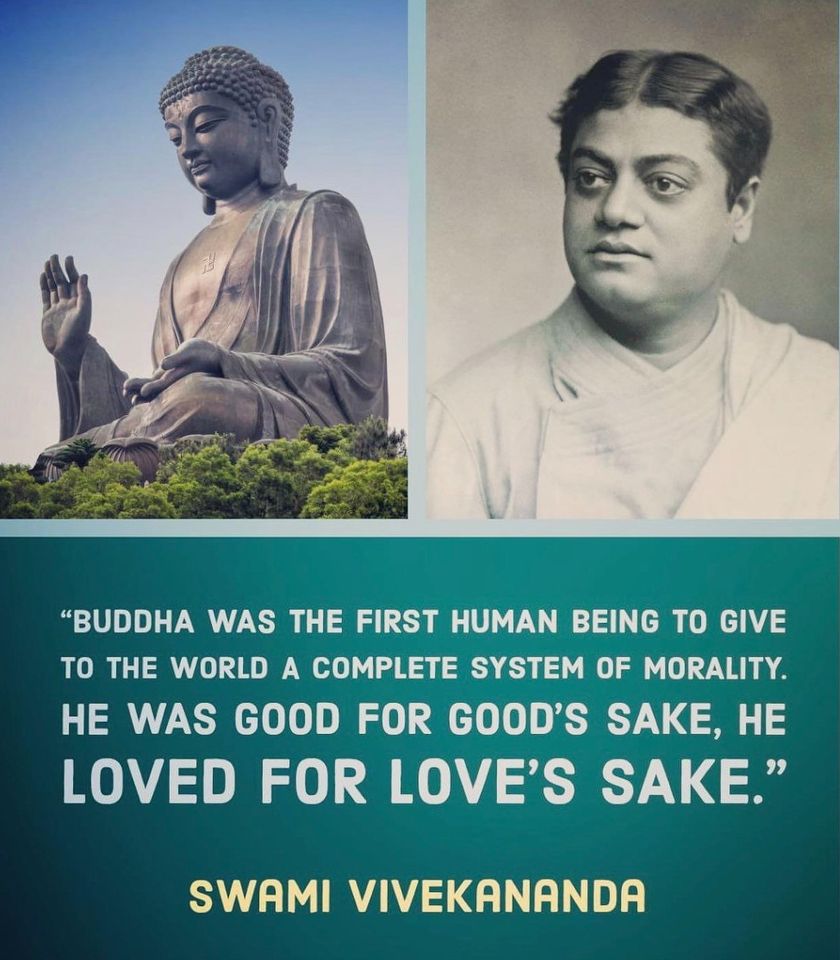
Are Christ and Buddha identical?
Swami Vivekananda told—
It is my particular fancy that the same Buddha became Christ. Buddha prophesied, “I will come again in five hundred years”, and Christ came here in five hundred years. These are the two Lights of the whole human nature. Two men have been produced, Buddha and Christ; these are the two giants, huge gigantic personalities, two Gods. Between them they divide the whole world. Wherever there is the least knowledge in the world, people bow down either to Buddha or Christ. It would be very hard to produce more like them, but I hope there will be. Mohammed came five hundred years after, five hundred years after came Luther with his Protestant wave, and this is five hundred years after that again. It is a great thing in a few thousand years to produce two such men as Jesus and Buddha. Are not two such enough? Christ and Buddha were Gods, the others were prophets. Study the life of these two and see the manifestation of power in them — calm and non – resisting, poor beggars owning nothing, without a cent in their pockets, despised all their lives, called heretic and fool — and think of the immense spiritual power they have wielded over humanity.[Source]
Notes taken down in Madras
Excerpts from the lectures delivered in Madras, 1892–1893:[Source]
- Hindus believe Buddha to be an Avatara.
- Buddha came to whip us into practice. Be good, destroy the passions. Then you will know for yourself whether Dvaita or Advaita philosophy is true—whether there is one or there are more than one.
- Buddha was a reformer of Hinduism.
- Buddhism proves nothing about the Absolute Entity. In a stream the water is changing; we have no right to call the stream one. Buddhist deny the one, and say, it is many. We say it is one and deny the many. What they call Karma is what we call the soul. According to Buddhism, man is a series of waves. Every wave dies, but somehow the first wave causes the second. That the second wave is identical with the first is illusion. To get rid of illusion good Karma is necessary. Buddhists do not postulate anything beyond the world. We say, beyond the relative there is the Absolute. Buddhism accepts that there is misery, and sufficient it is that we can get rid of this Duhkha (misery); whether we get Sukha (happiness) or not, we do not know. Buddha preached not the soul preached by others. According to the Hindus, soul is an entity or substance, and God is absolute. Both agree in this, that they destroy the relative. But Buddhists do not give what is the effect of that destruction of the relative.
- Buddha is said to have denied the Vedas because there is so much Himsa (killing) and other things. Every page of Buddhism is a fight with the Vedas (the ritualistic aspect). But he had no authority to do so.
- Buddha is expressly agnostic about God; but God is everywhere preached in our religion. The Vedas teach God—both personal and impersonal. God is everywhere preached in the Gita. Hinduism is nothing without God. The Vedas are nothing without Him. That is the only way to salvation. Sannyasins have to repeat the following, several times: I, wishing for Mukti, take refuge in God, who created the world, who breathed out the Vedas.
- Buddha, we may say now, ought to have understood the harmony of religions. He introduced sectarianism.
Buddha’s Message to the World
On 18 March 1900, Swami Vivekananda delivered a speech on Gautama Buddha in San Francisco, which was later published as Buddha’s Message to the World in the Complete Works of Swami Vivekananda. Following excerpts are taken from that lecture—[Source]
- The followers of Buddha were most enthusiastic and very missionary in spirit. They were the first among the adherents of various religions not to remain content with the limited sphere of their Mother Church. They spread far and wide. They travelled east and west, north and south. They reached into darkest Tibet; they went into Persia, Asia Minor; they went into Russia, Poland, and many other countries of the Western world. They went into China, Korea, Japan; they went into Burma, Siam, the East Indies, and beyond. When Alexander the Great, through his military conquests, brought the Mediterranean world in contact with India, the wisdom of India at once found a channel through which to spread over vast portions of Asia and Europe. Buddhist priests went out teaching among the different nations; and as they taught, superstition and priestcraft began to vanish like mist before the sun.
- To understand this movement properly you should know what conditions prevailed in India at the time Buddha came, just as to understand Christianity you have to grasp the state of Jewish society at the time of Christ. It is necessary that you have an idea of Indian society six hundred years before the birth of Christ, by which time Indian civilisation had already completed its growth.
- At the time Buddha was born, India was in need of a great spiritual leader, a prophet. There was already a most powerful body of priests. You will understand the situation better if you remember the history of the Jews — how they had two types of religious leaders, priests and prophets, the priests keeping the people in ignorance and grinding superstitions into their minds. The methods of worship the priests prescribed were only a means by which they could dominate the people. All through the Old Testament, you find the prophets challenging the superstitions of the priests. The outcome of this fight was the triumph of the prophets and the defeat of the priests.
- India was full of it in Buddha’s day. There were the masses of people, and they were debarred from all knowledge. If just a word of the Vedas entered the ears of a man, terrible punishment was visited upon him. The priests had made a secret of the Vedas — the Vedas that contained the spiritual truths discovered by the ancient Hindus!
At last one man could bear it no more. He had the brain, the power, and the heart — a heart as infinite as the broad sky. He felt how the masses were being led by the priests and how the priests were glorying in their power, and he wanted to do something about it. He did not want any power over any one, and he wanted to break the mental and spiritual bonds of men. His heart was large. The heart, many around us may have, and we also want to help others. But we do not have the brain; we do not know the ways and means by which help can be given. But this man had the brain to discover the means of breaking the bondages of souls. He learnt why men suffer, and he found the way out of suffering. He was a man of accomplishment, he worked everything out; he taught one and all without distinction and made them realise the peace of enlightenment. This was the man Buddha. - You know from Arnold’s poem, The Light of Asia, how Buddha was born a prince and how the misery of the world struck him deeply; how, although brought up and living in the lap of luxury, he could not find comfort in his personal happiness and security; how he renounced the world, leaving his princess and new – born son behind; how he wandered searching for truth from teacher to teacher; and how he at last attained to enlightenment. You know about his long mission, his disciples, his organisations. You all know these things.
- Buddha was the triumph in the struggle that had been going on between the priests and the prophets in India. One thing can be said for these Indian priests — they were not and never are intolerant of religion; they never have persecuted religion. Any man was allowed to preach against them. Theirs is such a religion; they never molested any one for his religious views. But they suffered from the peculiar weaknesses of all the priests: they also sought power, they also promulgated rules and regulations and made religion unnecessarily complicated, and thereby undermined the strength of those who followed their religion.
- Buddha cut through all these excrescences. He preached the most tremendous truths. He taught the very gist of the philosophy of the Vedas to one and all without distinction, he taught it to the world at large, because one of his great messages was the equality of man. Men are all equal. No concession there to anybody! Buddha was the great preacher of equality. Every man and woman has the same right to attain spirituality — that was his teaching. The difference between the priests and the other castes he abolished. Even the lowest were entitled to the highest attainments; he opened the door of Nirvana to one and all. His teaching was bold even for India. No amount of preaching can ever shock the Indian soul, but it was hard for India to swallow Buddha’s doctrine. How much harder it must be for you!
- His doctrine was this: Why is there misery in our life? Because we are selfish. We desire things for ourselves — that is why there is misery. What is the way out? The giving up of the self. The self does not exist; the phenomenal world, all this that we perceive, is all that exists. There is nothing called soul underlying the cycle of life and death. There is the stream of thought, one thought following another in succession, each thought coming into existence and becoming non – existent at the same moment, that is all; there is no thinker of the thought, no soul. The body is changing all the time; so is mind, consciousness. The self therefore is a delusion. All selfishness comes of holding on to the self, to this illusory self. If we know the truth that there is no self, then we will be happy and make others happy.
- This was what Buddha taught. And he did not merely talk; he was ready to give up his own life for the world. He said, “If sacrificing an animal is good, sacrificing a man is better”, and he offered himself as a sacrifice. He said, “This animal sacrifice is another superstition. God and soul are the two big superstitions. God is only a superstition invented by the priests. If there is a God, as these Brahmins preach, why is there so much misery in the world? He is just like me, a slave to the law of causation. If he is not bound by the law of causation, then why does he create? Such a God is not at all satisfactory. There is the ruler in heaven that rules the universe according to his sweet will and leaves us all here to die in misery — he never has the goodness to look at us for a moment. Our whole life is continuous suffering; but this is not sufficient punishment — after death we must go to places where we have other punishments. Yet we continually perform all kinds of rites and ceremonies to please this creator of the world!”
- Buddha said, “These ceremonials are all wrong. There is but one ideal in the world. Destroy all delusions; what is true will remain. As soon as the clouds are gone, the sun will shine”. How to kill the self? Become perfectly unselfish, ready to give up your life even for an ant. Work not for any superstition, not to please any God, not to get any reward, but because you are seeking your own release by killing your self. Worship and prayer and all that, these are all nonsense. You all say, “I thank God”– but where does He live? You do not know, and yet you are all going crazy about God.
- Buddha’s idea is that there is no God, only man himself. He repudiated the mentality which underlies the prevalent ideas of God. He found it made men weak and superstitious. If you pray to God to give you everything, who is it, then, that goes out and works? God comes to those who work hard. God helps them that help themselves. An opposite idea of God weakens our nerves, softens our muscles, makes us dependent. Everything independent is happy; everything dependent is miserable. Man has infinite power within himself, and he can realise it — he can realise himself as the one infinite Self. It can be done; but you do not believe it. You pray to God and keep your powder dry all the time.
- Buddha taught the opposite. Do not let men weep. Let them have none of this praying and all that. God is not keeping shop. With every breath you are praying in God. I am talking; that is a prayer. You are listening; that is a prayer. Is there ever any movement of yours, mental or physical, in which you do not participate in the infinite Divine Energy? It is all a constant prayer. If you call only a set of words prayer, you make prayer superficial. Such prayers are not much good; they can scarcely bear any real fruit.
- The life of Buddha has an especial appeal. All my life I have been very fond of Buddha, but not of his doctrine. I have more veneration for that character than for any other — that boldness, that fearlessness, and that tremendous love! He was born for the good of men. Others may seek God, others may seek truth for themselves; he did not even care to know truth for himself. He sought truth because people were in misery.
How to help them, that was his only concern. Throughout his life he never had a thought for himself. How can we ignorant, selfish, narrow – minded human beings ever understand the greatness of this man?
And consider his marvellous brain! No emotionalism. That giant brain never was superstitious. Believe not because an old manuscript has been produced, because it has been handed down to you from your forefathers, because your friends want you to — but think for yourself; search truth for yourself; realise it yourself. Then if you find it beneficial to one and many, give it to people. Soft – brained men, weak – minded, chicken – hearted, cannot find the truth. One has to be free, and as broad as the sky. One has to have a mind that is crystal clear; only then can truth shine in it. We are so full of superstitions! Even in your country where you think you are highly educated, how full of narrownesses and superstitions you are! Just think, with all your claims to civilisation in this country, on one occasion I was refused a chair to sit on, because I was a Hindu. - Six hundred years before the birth of Christ, at the time when Buddha lived, the people of India must have had wonderful education. Extremely free – minded they must have been. Great masses followed him. Kings gave up their thrones; queens gave up their thrones. People were able to appreciate and embrace his teaching, so revolutionary, so different from what they had been taught by the priests through the ages! But their minds have been unusually free and broad.
- Gautama Buddha’s death: And consider his death. If he was great in life, he was also great in death. He ate food offered to him by a member of a race similar to your American Indians. Hindus do not touch them, because they eat everything indiscriminately. He told his disciples, “Do not eat this food, but I cannot refuse it. Go to the man and tell him he has done me one of the greatest services of my life — he has released me from the body.” An old man came and sat near him — he had walked miles and miles to see the Master — and Buddha taught him. When he found a disciple weeping, he reproved him, saying, “What is this? Is this the result of all my teaching? Let there be no false bondage, no dependence on me, no false glorification of this passing personality. The Buddha is not a person; he is a realisation. Work out your own salvation.”
Even when dying, he would not claim any distinction for himself. I worship him for that. What you call Buddhas and Christs are only the names of certain states of realisation. Of all the teachers of the world, he was the one who taught us most to be self – reliant, who freed us not only from the bondages of our false selves but from dependence on the invisible being or beings called God or gods. He invited every one to enter into that state of freedom which he called Nirvana. All must attain to it one day; and that attainment is the complete fulfilment of man
Swami Vivekananda on Buddhism
Main article: Swami Vivekananda on Buddhism
Related Articles:
- The Passing Away of Buddha – Swami Vivekananda
- Swami Vivekananda Quotes on Jesus Christ
- Swami Vivekananda Quotes on Ramakrishna
- Buddhism, the Fulfilment of Hinduism – Swami Vivekananda
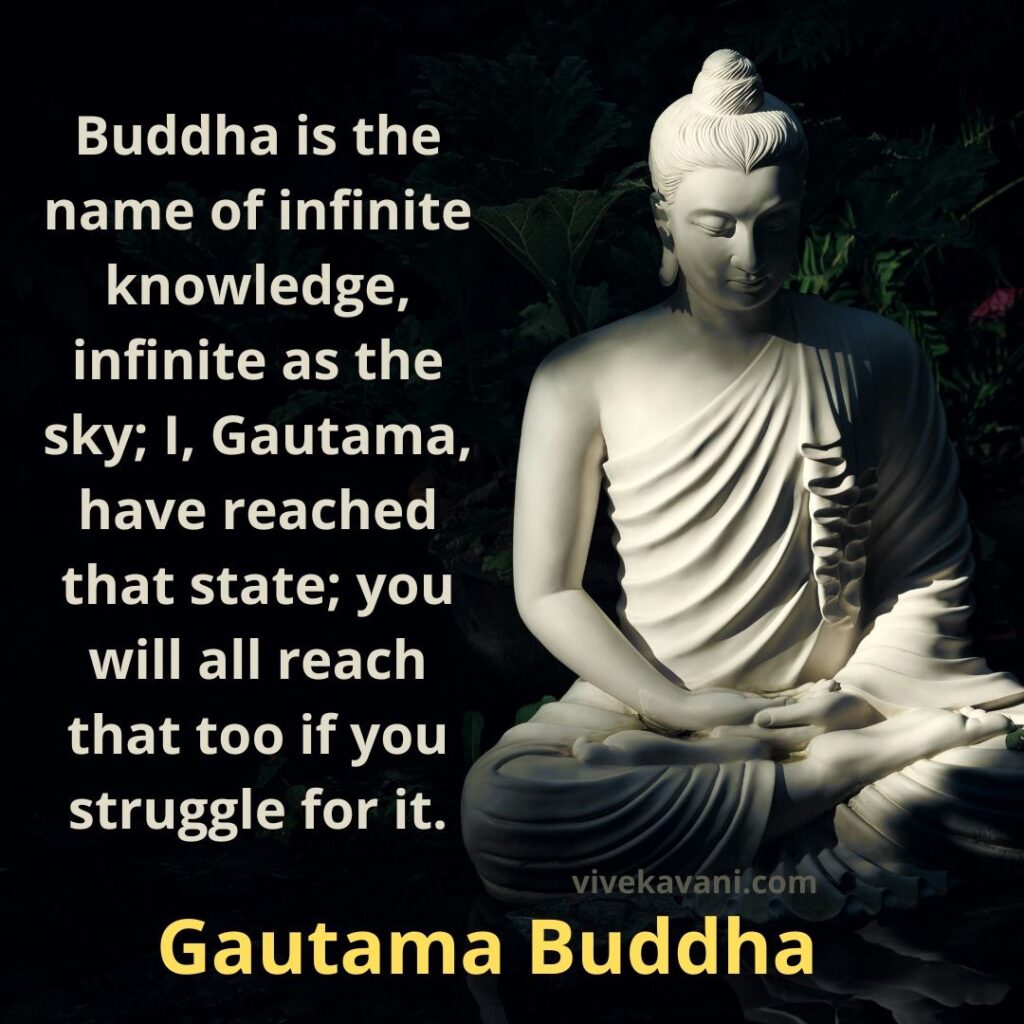
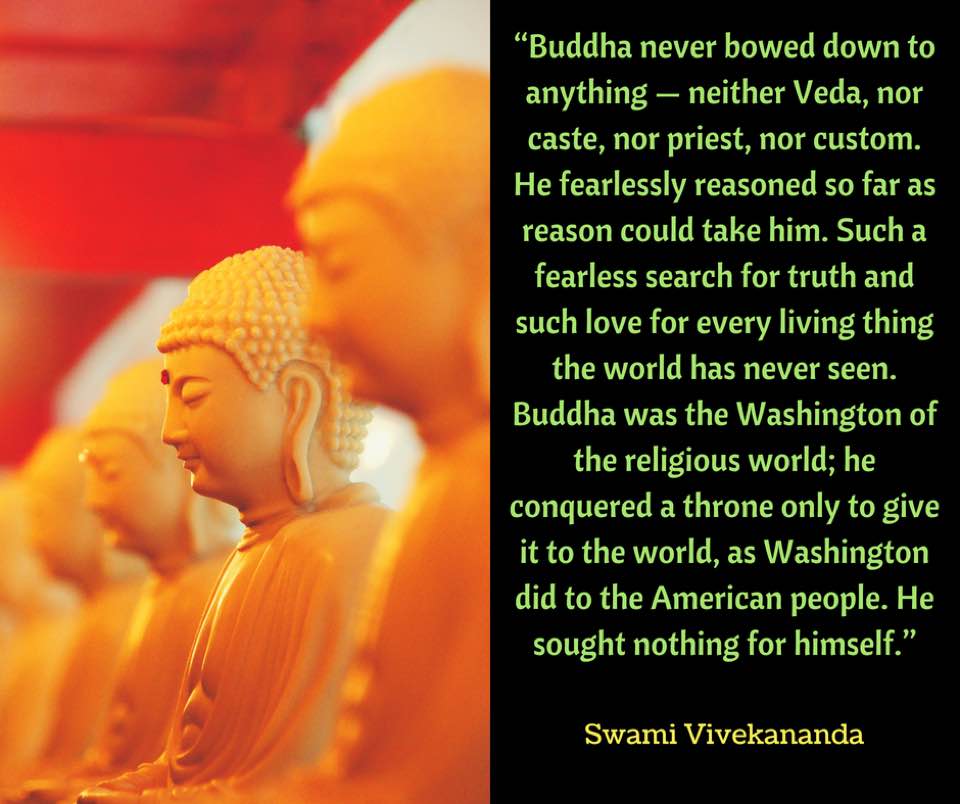
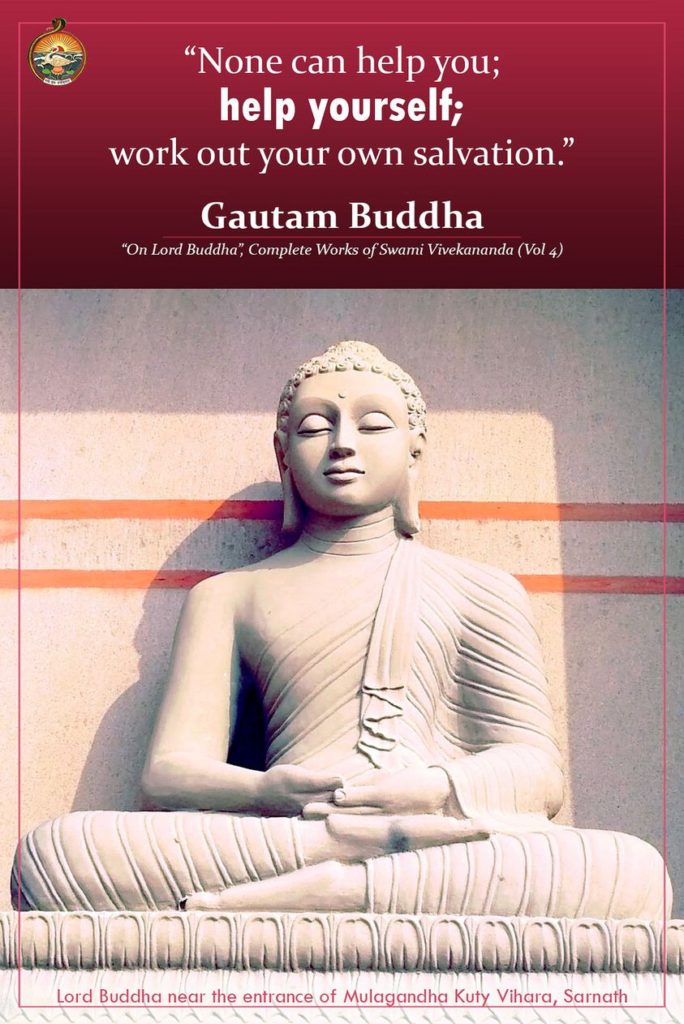
External links
- Addresses at The Parliament of Religions — Buddhism, the Fulfilment of Hinduism (26 September 1893) from The Complete Works of Swami Vivekananda Volume I
- Buddhistic India from The Complete Works of Swami Vivekananda Volume III
- On Lord Buddha from The Complete Works of Swami Vivekananda Volume IV


